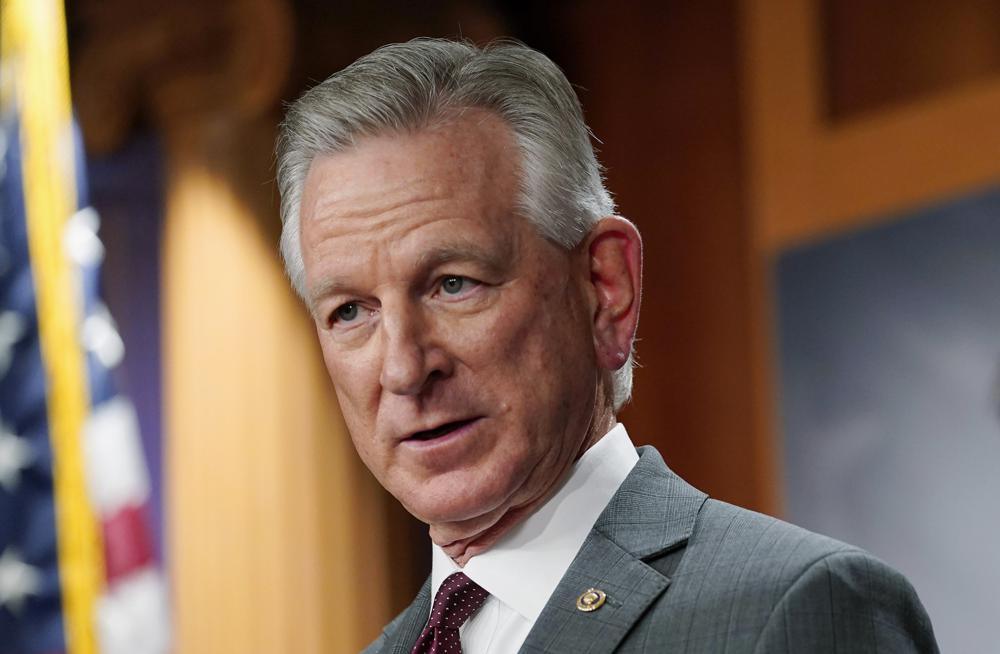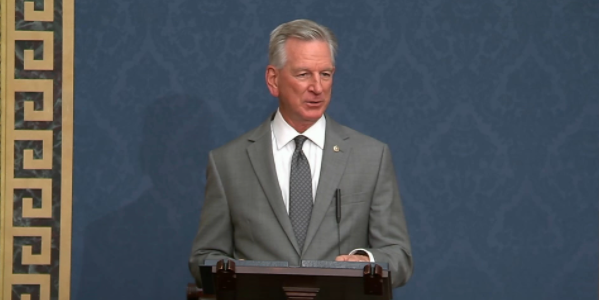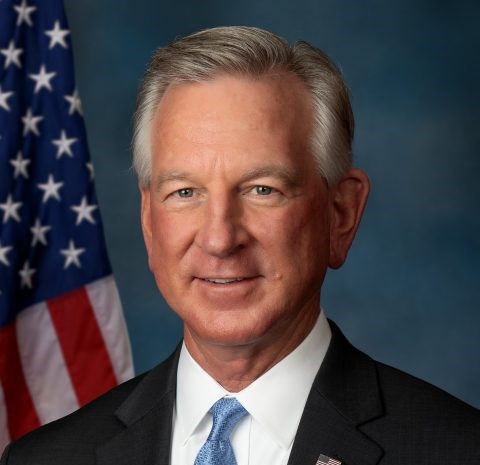Tommy Tuberville opposes biological males competing in women’s sports

U.S. Senator Tommy Tuberville authored an op-ed in National Review outlining his reintroduction of the Protection of Women and Girls in Sports Act to preserve Title IX protections and keep biological males from competing in female sports. The reintroduction of this legislation comes as the U.S. Department of Education is moving forward to implement new rules in May that would allow biological males to compete in girls’ and women’s sports beginning in the 2023-2024 school year. “50 years ago, we discovered a winning strategy for all of America’s female athletes: Title IX. Signed into law in 1972, the 37 words of this relatively simple legislation empowered women to win by leveling the playing field and providing them access to the same athletic opportunities that their male counterparts enjoyed,” Tuberville wrote. “That level playing field is now under attack by activists who care more about politics than what’s best for female athletes.” “We must protect women’s sports. That is why I reintroduced the Protection of Women and Girls in Sports Act yesterday to push back against the far left’s attempts to destroy women’s sports and preserve the opportunities they have provided female athletes for half a century,” Tuberville explained.” My legislation would require institutions to recognize an athlete’s gender as what it was at birth and stop giving federal funding to any program or institution that allows biological males in women’s sports.” “Last year, on the 50th anniversary of Title IX, the Department of Education proposed a new rule to allow biological males to compete in women’s sports, citing the change as more ‘inclusive.’” Tuberville continued. “I submitted a public comment to the proposed rule change and discussed seeing the positive impacts of Title IX firsthand, four years after its enactment, while coaching girls’ basketball at Hermitage High School in Arkansas. But like those of many other athletes, coaches, educators, and parents, my concerns were ignored by Secretary Miguel Cardona as the Department of Education charged ahead with plans to finalize this change in May.” “There is nothing inclusive about forcing female athletes who train all their lives in hopes of achieving first place to instead compete for second, third, and fourth place because the top spot is invariably taken by athletes who have obvious physical advantages associated with their gender,” Tuberville said. “Biological men have won 28 women’s sports titles since 2003. This number will only increase when the boundaries are completely removed.” Tuberville appeared on Fox and Friends to defend women’s sports. Specifically, the Protection of Women and Girls in Sports Act will: Ensure Title IX provisions treat gender as “recognized based solely on a person’s reproductive biology and genetics at birth.” Ban recipients of federal funding from operating, sponsoring, or facilitating athletic programs that permit a male to participate in a women’s sporting event. The legislation is endorsed by Independent Women’s Voice, Concerned Women for America, and Heritage Action for America. Carrie Lukas is the vice president of Independent Women’s Voice. “More than 50 years ago, Congress enacted Title IX to ensure equal opportunity in all aspects of education, including athletics,” said Lukas. “But without single-sex teams and single-sex competition, equal athletic opportunity is but a farce. Forcing female athletes to compete against biological males is unfair. But it’s also discriminatory. Allowing biological males to take awards, roster spots, scholarships, or spots at a school from female athletes violates Title IX’s prohibition of discrimination ‘on the basis of sex.’ The Protection of Women and Girls in Sports Act will help preserve equal athletic opportunity for both sexes. IWV is thankful for Senator Tuberville’s leadership on this important issue.” Penny Nance is the CEO and President of Concerned Women for America Legislative Action Committee – the largest women’s policy organization. “We have championed the cause of a fair playing field for female athletes for years,” said Nance. “Understanding the importance of sports, Coach Tommy Tuberville has proven to be a leader on the issue. It’s time for Congress to stop injustice and discrimination against female student-athletes in their own sports. Our Young Women for America leaders have experienced the embarrassment of competing against men and are fighting this battle on their college campuses. Passing the Protection of Women and Girls in Sports Act is a top priority. Never again should female athletes lose their trophies, their scholarships, and their dignity to males.” Jessica Anderson, executive director of Heritage Action for America, stated. “By ignoring the biological differences between men and women and forcing women to compete against men in sports, the Left is threatening to limit women’s opportunities on and off the field. The Protection of Women and Girls in Sports Act protects women’s physical safety and scholarship opportunities by making it illegal for a recipient of federal funds who operates, sponsors, or facilitates athletic programs to allow men to participate in women’s athletic teams or programs. Heritage Action supports the passage of this essential legislation and thanks Senator Tuberville for leading the fight in the Senate to protect women’s safety, privacy, and opportunities.” Joining Tuberville as original cosponsors are U.S. Senators Mike Lee (R-Utah), James Lankford (R-Oklahoma), Tom Cotton (R-Arkansas), Marsha Blackburn (R-Tennessee), Roger Marshall, M.D. (R-Kansas), Ted Budd (R-North Carolina), Kevin Cramer (R-North Dakota), Cindy Hyde-Smith (R-Mississippi), Mike Braun (R-Indiana), Rick Scott (R-Florida), Jim Risch (R-Idaho), Mike Crapo (R-Idaho), Bill Hagerty (R-Tennessee), Marco Rubio (R-Florida), Joni Ernst (R-Iowa), Cynthia Lummis (R-Wyoming), Steve Daines (R-Montana), and Josh Hawley (R-Missouri). Tommy Tuberville spent decades as a teacher and coach prior to his election to the Senate in 2020. To connect with the author of this story or to comment, email brandonmreporter@gmail.com.
Katie Britt and Tommy Tuberville reintroduce bill to limit immigration paroles

U.S. Senator Katie Britt announced on Thursday that she joined Sens. Chuck Grassley, Tommy Tuberville, and six of their Republican colleagues in reintroducing the Immigration Parole Reform Act of 2023, limiting the executive branch’s flexibility in choosing to offer immigration parole. “There is no doubt that there is an unprecedented humanitarian and national security crisis at the border, and it’s devastating families and communities across America,” said Sen. Britt. “In addition to the Biden Administration’s weak border agenda, the President’s continued abuse of our immigration system is only compounding the problem. The chaotic combination of lawless catch-and-release and expansive parole practices must end.” Senator Britt is the Ranking member of the Homeland Security subcommittee of the Senate Committee on Appropriations, “The executive branch’s abuse of immigration parole is unacceptable and totally out of line with congressional intent,” said Sen. Grassley. “I’m proud to lead the fight to curb the abuse of immigration parole and restore order to our immigration system.” “The Biden administration is using dangerous loopholes to let more illegal immigrants into the country,” said Sen. Tuberville. “Giving parole to hundreds of thousands of illegal immigrants artificially decreases the number of apprehensions at the border and instead allows them right into the country. The American people are smarter than President [Joe] Biden thinks and can see through this abuse of power. I am proud to join this legislation that clarifies executive parole authority to ensure the Department of Homeland Security enforces our immigration laws. We shouldn’t have to pass a law requiring DHS to do its job, but I’m committed to doing what it takes to secure our southern border and hold our leaders accountable.” Immigration parole was first established in 1952. It allows the executive branch to temporarily grant individuals entry into the United States on a case-by-case basis for urgent humanitarian reasons or significant public benefit. Sen. Britt and her colleagues said that several presidential administrations have abused this authority to admit entire categories of individuals in circumvention of congressionally-established pathways to allow foreign nationals to enter the United States. Some of these parole programs were created even after Congress repeatedly rejected or failed to consider and enact legislative proposals that would have created an immigration pathway for those covered by the programs. This bill would make several reforms to ensure the executive branch complies with the original, long-standing congressional intent for the immigration parole authority. It would, among other changes, clarify that parole may not be granted according to criteria that describes entire categories of potential parolees and very clearly define what qualifies as an “urgent humanitarian reason” or “significant public benefit.” It would also provide clarity on the timing and extension of immigration parole, among other reforms. Sens. Britt, Grassley, and Tuberville were joined by Sens. Tom Cotton, Bill Cassidy, J.D. Vance, James Lankford, Mike Lee, and Joni Ernst in cosponsoring this legislation. Britt was elected to the Senate in her first run for public office. She is an attorney, former President and CEO of the Business Council of Alabama (BCA), and former Chief of Staff for former U.S. Sen. Richard Shelby. She and her husband, Wesley, live in Montgomery with their children. To connect with the author of this story or to comment, email brandonmreporter@gmail.com.
Katie Britt believes Alabama taxpayers do not want taxes paying for elective abortions

United States Senators Katie Britt and Roger Wicker joined 45 other Senators in introducing the No Taxpayer Funding for Abortion Act. This legislation would establish a single, government-wide standard to permanently prohibit the flow of federal funding for abortion. “The vast majority of Alabamians do not want their hard-earned dollars funding elective abortions in California and New York,” Britt stated. “The Hyde Amendment has saved an estimated 2.5 million lives – approximately half the population of Alabama,” said Sen. Britt. “Sadly, radicals in the Democratic Party continue to trumpet their calls for abortion at any time, for any reason. They have now targeted the long-standing, bipartisan Hyde Amendment, annually passed by Congress since 1976, which ensures federal taxpayer dollars are not used to fund abortions. It is time to make the Hyde Amendment and its lifesaving protections permanent so the far-left does not attempt to hold the nation hostage every year. The vast majority of Alabamians do not want their hard-earned dollars funding elective abortions in California or New York. I will continue to fight to defend life, support parents, grow opportunities for hardworking families, and preserve the American Dream for our children and our children’s children.” “Most Americans do not want their hard-earned tax dollars being used for abortion-on-demand, but our current patchwork of regulations has brought years of uncertainty,” stated Sen. Wicker. “The No Taxpayer Funding for Abortion Act would simplify federal rules, ensuring that American tax dollars are never used for the destruction of innocent, unborn life.” This legislation would make permanent the restrictions on funding for elective abortion and elective abortion coverage, including the Hyde Amendment, which currently relies on yearly approval. It would also eliminate Obamacare’s taxpayer subsidies for elective abortion coverage on the Affordable Care Act exchanges through refundable tax credits. U.S. Sen. Tommy Tuberville (R-Alabama) also co-sponsored the legislation. “Millions of hardworking Americans believe that life begins at conception and don’t want their taxpayer dollars inadvertently funding abortions,” said Sen. Tuberville. “As a Christian and as a conservative, I share their belief that every life is sacred and every American has a right to life. That’s why I’m proud to sign on to this legislation that will solidify abortion funding restrictions that have been in place for decades and better protect the unborn.” Britt, Tuberville, and Wicker joined Sens. Mitch McConnell (R-Kentucky) John Barrasso (R-Wyoming), Marsha Blackburn (R-Tennessee), John Boozman (R-Arkansas), Mike Braun (R-Indiana), Ted Budd (R-North Carolina), Shelley Moore Capito (R-West Virginia), Bill Cassidy (R-Louisiana), John Cornyn (R-Texas), Tom Cotton (R-Arkansas), Kevin Cramer (R-North Dakota), Mike Crapo (R-Idaho), Ted Cruz (R-Texas), Steve Daines (R-Montana), Joni Ernst (R-Iowa), Deb Fischer (R-Nebraska), Lindsey Graham (R-South Carolina), Chuck Grassley (R-Iowa), Bill Hagerty (R-Tennessee), Josh Hawley (R-Missouri), John Hoeven (R-North Dakota), Cindy Hyde-Smith (R-Mississippi), Ron Johnson (R-Wisconsin), John Kennedy (R-Louisiana), James Lankford (R-Oklahoma), Mike Lee (R-Utah), Cynthia Lummis (R-Wyoming), Roger Marshall (R-Kansas), Jerry Moran (R-Kansas), Markwayne Mullin (R-Oklahoma), Rand Paul (R-Kentucky), Pete Ricketts (R-Nebraska), Jim Risch (R-Idaho), Mitt Romney (R-Utah), Mike Rounds (R-South Dakota), Marco Rubio (R-Florida), Eric Schmitt (R-Missouri), Rick Scott (R-Florida), Tim Scott (R-South Carolina), Dan Sullivan (R-Alaska), Thom Tillis, (R-North Carolina), John Thune (R-South Dakota), J.D. Vance (R-Ohio), and Todd Young (R-Indiana). With Democrats in control of the Senate, it is unlikely that Senate Majority Leader Chuck Schumer will allow this bill to even be introduced on the Senate floor. To connect with the author of this story or to comment, email brandonmreporter@gmail.com.
Tommy Tuberville supports bill to permanently ban taxpayer funding for abortions

U.S. Senators Tommy Tuberville and Katie Britt joined 45 of their Senate colleagues in introducing the No Taxpayer Funding for Abortion Act to establish a permanent prohibition on federal funding for abortion. Tuberville said in a statement, “Every life is sacred.” “Millions of hardworking Americans believe that life begins at conception and don’t want their taxpayer dollars inadvertently funding abortions,” said Sen. Tuberville stated. “As a Christian and as a conservative, I share their belief that every life is sacred and every American has a right to life. That’s why I’m proud to sign on to this legislation that will solidify abortion funding restrictions that have been in place for decades and better protect the unborn.” “Most Americans do not want their hard-earned tax dollars being used for abortion-on-demand, but our current patchwork of regulations has brought years of uncertainty,” Sen. Roger Wicker said. “The No Taxpayer Funding for Abortion Act would simplify federal rules, ensuring that American tax dollars are never used for the destruction of innocent, unborn life.” The bill seeks to change 40 years of inconsistent policies that have regulated federal funding for abortion. It would make funding restrictions permanent for abortion and elective abortion coverage, including the Hyde Amendment, which requires annual approval. The legislation would also eliminate taxpayer-funded subsidies for elective abortion coverage currently offered on Affordable Care Act exchanges through refundable tax credits. Tuberville, Wicker, and Britt joined Sens. Mitch McConnell (R-Kentucky) John Barrasso (R-Wyoming), Marsha Blackburn (R-Tennessee), John Boozman (R-Arkansas), Mike Braun (R-Indiana), Ted Budd (R-North Carolina), Shelley Moore Capito (R-West Virginia), Bill Cassidy (R-Louisiana), John Cornyn (R-Texas), Tom Cotton (R-Arkansas), Kevin Cramer (R-North Dakota), Mike Crapo (R-Idaho), Ted Cruz (R-Texas), Steve Daines (R-Montana), Joni Ernst (R-Iowa), Deb Fischer (R-Nebraska), Lindsey Graham (R-South Carolina), Chuck Grassley (R-Iowa), Bill Hagerty (R-Tennessee), Josh Hawley (R-Missouri), John Hoeven (R-North Dakota), Cindy Hyde-Smith (R-Mississippi), Ron Johnson (R-Wisconsin), John Kennedy (R-Louisiana), James Lankford (R-Oklahoma), Mike Lee (R-Utah), Cynthia Lummis (R-Wyoming), Roger Marshall (R-Kansas), Jerry Moran (R-Kansas), Markwayne Mullin (R-Oklahoma), Rand Paul (R-Kentucky), Pete Ricketts (R-Nebraska), Jim Risch (R-Idaho), Mitt Romney (R-Utah), Mike Rounds (R-South Dakota), Marco Rubio (R-Florida), Eric Schmitt (R-Missouri), Rick Scott (R-Florida), Tim Scott (R-South Carolina), Dan Sullivan (R-Alaska), Thom Tillis, (R-North Carolina), John Thune (R-South Dakota), J.D. Vance (R-Ohio), and Todd Young (R-Indiana). Swing Republican Sens. Lisa Murkowski and Susan Collins did not sign off on the legislation, and neither did any of the 52 Senate Democrats who hold the majority in the body. U.S. Representative Christopher Smith (R-New Jersey) has introduced similar legislation in the House of Representatives. To connect with the author of this story, or to comment, email brandonmreporter@gmail.com.
Sen. Katie Britt votes against confirming Brendan Owens

On Monday, U.S. Senator Katie Britt today cast her first-ever vote in the Senate; when she voted against the confirmation of Brendan Owens to serve as Assistant Secretary for Energy, Installations, and Environment in the Department of Defense. Owens was originally nominated by President Joe Biden in March 2022 but failed to muster the support to get a floor vote during the 117th Congress. President Biden re-nominated Owens in January 2023 at the start of the 118th Congress. “The Biden Administration has consistently prioritized their reckless leftwing political agenda to the detriment of our military readiness,” said Sen. Britt. “This nominee would simply be the tip of the spear in continuing President Biden’s radical ‘Green New Deal’ priorities at the Department of Defense, which should be focused on ensuring our incredible men and women in uniform are the best equipped, resourced, and trained in the world. We achieve peace through strength, not wokeness. The last thing we need is a DOD appointee from the ESG movement.” The U.S. Senate confirmed Owens on Monday night with 60 “yea” and 35 “nay” votes. A number of Republicans voted to confirm Owens, including Sens. Shelley Moore Capito of West Virginia, Susan Collins of Maine, John Cornyn of Texas, Joni Ernst of Iowa, Lindsey Graham of South Carolina, Chuck Grassley of Iowa, Mitch McConnell of Kentucky, Jerry Moran of Kansas, Mitt Romney of Utah, Mike Rounds of South Dakota, Thom Tillis of North Carolina, Roger Wicker of Mississippi, and Todd Young of Indiana. Britt was elected in a landslide by the voters of Alabama in November after besting four rivals in the Alabama Republican Primary last spring. Senate is the first elected office she has ever held. Britt and her husband, Wesley, live in Montgomery with their two children. To connect with the author of this story, or to comment, email brandonmreporter@gmail.com.
Tommy Tuberville works to undo vaccine mandates for military

U.S. Senator Tommy Tuberville joined colleagues in an effort to secure a provision in the 2023 National Defense Authorization Act (NDAA) to protect servicemembers from the Biden administration’s controversial COVID-19 vaccine mandate. The NDAA was passed last night in the Senate. Sen. Marsha Blackburn (R-Tennessee) led a group that included Sens. Tuberville, Roger Marshall (R-Kansas), Cindy Hyde-Smith (R-Mississippi), Mike Braun (R-Indiana), Deb Fischer (R-Nebraska), Joni Ernst (R- Iowa), Mike Crapo (R-Idaho), Steve Daines (R-Montana), John Hoeven (R-North Dakota), and Jim Risch (R-Idaho) in a joint statement after helping to successfully secure the provision protecting the servicemembers from the mandate in the 2023 NDAA. “In the United States, the number of new servicemembers joining the military is reaching a near record low,” the Sens. wrote in a joint statement. “The United States needs a strong military to protect our country against the growing threats facing our nation. We are pleased that the final conferenced bill includes language mirroring our amendments’ efforts to protect troops from being fired due to Biden’s COVID vaccine mandate without fair appeal and to the harm of service readiness.” Tuberville has expressed concerns about the historically low military recruitment numbers; and how the COVID-19 vaccination requirements for service members is affecting the military’s ability to recruit and retain personnel. Tuberville has repeatedly addressed these concerns to top U.S. Department of Defense officials and called for hearings on the issue. “Only nine percent — only nine percent — of young people even want to serve,” Tuberville said in a recent Senate hearing with DoD officials. “That’s a small, small pool. Faith in our military has collapsed. I’ve reviewed the list of speaking engagements for senior leaders at the Pentagon and could find no trace — zero — of anyone speaking publicly about recruiting. The leaders of our military. But there were plenty of speeches on climate change, pride month, and global water security. What is going on here?” Additionally, Sen. Tuberville has helped introduce two pieces of legislation, Preserving the Readiness of Our Armed Forces Act and Stop Firing Our Servicemembers Act, to push back against the Biden administration’s mandates. The Preserving the Readiness of our Armed Forces Actwould prohibit the involuntary dismissal of a service member for refusing the COVID-19 vaccine until each military service achieves its authorized end strength; while the Stop Firing our Servicemembers Act would prohibit federal funds from being used to require a member of the National Guard to receive a COVID-19 vaccination. The NDAA is a bipartisan bill that sets the goals for the U.S. military each year. Tuberville is in his first term representing the state of Alabama in the U.S. Senate. To connect with the author of this story, or to comment, email brandonmreporter@gmail.com.
U.S. Senate to vote on Respect for Marriage Act; several groups say it’s unconstitutional

Several groups argue the Respect for Marriage Act (ROMA) currently before the U.S. Senate is unconstitutional and, if enacted, will eventually be struck down by the U.S. Supreme Court. The bill, HR 8404, was introduced in the House by U.S. Rep. Jerry Nadler, D-NY, on July 18 and passed by a vote of 267-157 the next day. The U.S. Senate took it up on Nov. 14. It would provide “statutory authority for same-sex and interracial marriages” and repeal several provisions of the 1996 Defense of Marriage Act (DOMA). The 1996 law received bipartisan support, including from then U.S. Sen. Joe Biden and U.S. Rep. Chuck Schumer, D-NY, and from Democratic President Bill Clinton, who signed it. When a constitutional amendment was proposed to ban same-sex marriage in 2006, Sen. Biden told Meet the Press’s Tim Russert, “I can’t believe the American people can’t see through this. We already have a law, the Defense of Marriage Act … where I voted and others … that marriage is between a man and a woman, and states must respect that. … Why do we need a constitutional amendment? Marriage is between a man and a woman.” Sixteen years later, President Biden now supports replacing DOMA provisions, which “define, for purposes of federal law, marriage as between a man and a woman and spouse as a person of the opposite sex,” with ROMA provisions “that recognize any marriage that is valid under state law,” according to the bill summary. The summary also notes that the Supreme Court ruled three marriage-related laws as unconstitutional: DOMA (U.S. v. Windsor, 2013) and state laws banning same-sex marriage (Obergefell v. Hodges, 2015), and interracial marriage (Loving v. Virginia 1967). The bill would also allow “the Department of Justice to bring a civil action and establishes a private right of action for violations,” its summary states. When filing a cloture motion on a substitute amendment on Nov. 17, now Senate Majority Leader Schumer said the Senate would vote on ROMA when it returned on Monday after Thanksgiving. He said, “Let me be clear,” passing it “is not a matter of if but only when.” He also thanked his colleagues from both sides of the aisle “who led this bill.” Twelve Republicans voted with Democrats to allow it to move forward, eliminating a filibuster threat: Sens. Roy Blunt, Richard Burr, Shelley Capito, Susan Collins, Cynthia Lummis, Rob Portman, Mitt Romney, Dan Sullivan, Thom Tillis, Joni Ernst, Lisa Murkowski, and Todd Young. After their vote, Biden said, “Love is love, and Americans should have the right to marry the person they love,” adding their vote made “the United States one step closer to protecting that right in law.” Schumer also said he had “zero doubt” the bill “will soon be law of the land.” But multiple groups disagree, arguing it’s unconstitutional for the same reasons the Supreme Court struck down DOMA. Because the court already ruled Congress doesn’t have the constitutional authority to define marriage under Article 1 of the U.S. Constitution, and because ROMA is nearly identical to DOMA, they argue it will also likely be struck down. In a letter to Congress, the nonprofit religious freedom organization Liberty Counsel argues the court ruled in Windsor, “DOMA, because of its reach and extent, departs from this history and tradition of reliance on state law to define marriage.” It also ruled, “[b]y history and tradition the definition and regulation of marriage . . . has been treated as being within the authority and realm of the separate States.” Liberty Counsel Founder and Chairman Mat Staver, said, “The Constitution cannot be said to prohibit the exercise of power to define marriage in one manner yet authorize the opposite definition of that same unconstitutional exercise of power. If Windsor noted that Congress lacked authority in this realm, then it necessarily lacks the power here.” While a bipartisan amendment was introduced claiming to protect religious liberty, Sen. Mike Lee, R-Utah, argues it really doesn’t. “Religious Americans will be subject to potentially ruinous litigation, while the tax-exempt status of certain charitable organizations, educational institutions, and non-profits will be threatened. My amendment would have shored up these vulnerabilities,” he said. Heritage Foundation President Kevin Roberts said, “Conservatives are deeply disappointed by the betrayal of Senate Republicans to protect Americans’ religious freedom and won’t soon forget the votes of the 12 Republican senators who cast aside an essential right in a bill that will weaponize the federal government against believers of nearly every major religion.” Gregory Baylor, senior counsel with Alliance for Defending Freedom, also said the law is “unnecessary and could have a disastrous effect on religious freedom. While proponents of the bill claim that it simply codifies the 2015 Obergefell decision, in reality, it is an intentional attack on the religious freedom of millions of Americans with sincerely held beliefs about marriage.” It also “threatens religious freedom and the institution of marriage” by codifying a “false definition of marriage in the American legal fabric,” ADF argues. It also “opens the door to federal recognition of polygamous relationships, jeopardizes the tax-exempt status of nonprofits that exercise their belief that marriage is the union of one man and one woman, and endangers faith-based social-service organizations by threatening litigation and liability risk if they follow their views on marriage when working with the government.” Republished with the permission of The Center Square.
National Federation of Independent Businesses endorses Katie Britt for U.S. Senate

Republican nominee for U.S. Senate Katie Boyd Britt announced on Monday that her campaign has been endorsed by the National Federation of Independent Business (NFIB), the nation’s leading small business advocacy organization. The NFIB endorsement was announced at a campaign event hosted at NFIB member small business Tang’s Alterations in Montgomery on Friday. “Katie Britt has shown a strong commitment to small business, especially during the COVID-19 lockdown,” said Rosemary Elebash, NFIB Alabama State Director. “NFIB worked closely with Katie when she represented the Business Council of Alabama. We were partners on multiple issues with the Governor’s office, including implementing Alabama Small Business Grants, replenishing the Alabama Unemployment Trust Fund to avoid a 500% tax increase, passing COVID-19 liability protection for businesses, and serving together on the Lt. Governor’s Small Business Emergency Task Force Committee to ‘Reopen Alabama Responsibly.’ During the campaign, Katie has visited with small business owners in all 67 counties and heard their concerns about government overreach with taxes, mandates, rules, and regulations. She will work closely with NFIB to promote policies to assist small businesses when she is elected to the U.S. Senate.” The endorsement was issued by NFIB FedPAC, NFIB’s political action committee. NFIB FedPAC is funded by voluntary contributions by NFIB members over and above their membership dues. Decisions made by the NFIB FedPAC are managed by a member-driven grassroots evaluation. “We are confident that Katie Britt will be a voice for small business owners in Congress,” said Sharon Sussin, NFIB Senior National Political Director. “She has proven to be a consistent small business supporter and understands the challenges small business owners face. We are pleased to endorse her today.” “I’m honored to have the endorsement of NFIB and Alabama’s incredible small businesses,” said Katie Britt. “Growing up as the daughter of two small business owners in the Wiregrass, I saw firsthand the challenges my parents faced and the sacrifices they made for our family and their team members — just as small business owners across Alabama do every day. In the U.S. Senate, I’m going to be a champion for small businesses in every corner of our great state, and I’ll fight to ensure Main Streets are able to grow and thrive.” Prior to her run for Senate, Britt was the President and CEO of the powerful Business Council of Alabama (BCA), a close ally of NFIB. Britt has already announced the respective endorsements of the Home Builders Association of Alabama, the Alabama Farmers Federation’s FarmPAC, the Alabama Retail Association, Manufacture Alabama, the Automobile Dealers Association of Alabama, the Alabama Forestry Association, the Associated Builders and Contractors of Alabama, the League of Southeastern Credit Unions, the Alabama Restaurant and Hospitality Association, University of Alabama Crimson Tide legend Siran Stacy, Mobile Mayor Sandy Stimpson, the Alabama Mining Association, U.S. Senator Tom Cotton, former White House press secretary Sarah Huckabee Sanders, U.S. Senator Joni Ernst, the Alabama Rural Electric Association of Cooperatives, former President Donald Trump, the National Association of Realtors PAC, Associated General Contractors of America PAC, U.S. Senator Tim Scott, U.S. Senator Tommy Tuberville, National Right to Life, and SBA Pro-life America. Britt grew up working at several small businesses. She is an attorney and is a former chief of staff for U.S. Senator Richard Shelby, whose seat she is running for. Shelby is retiring at the end of the year and has endorsed Britt. Britt has a bachelor’s degree from the University of Alabama and a law degree from the University of Alabama School of Law. She is a native of Coffee County and is a graduate of Enterprise High School. Britt is married to former University of Alabama and New England Patriots football player Wesley Britt. They reside in Montgomery with their two children. Britt faces Libertarian nominee John Sophocles and Democratic nominee Dr. Will Boyd in the November 8 general election. To connect with the author of this story, or to comment, email brandonmreporter@gmail.com.
Joe Guzzardi: Pro-Environment platform a mid-term winner

The latest mid-term election polling shows that Republicans and Democrats are dead even. In January, the same polling firm Statista had the GOP ahead by four points. Other polls like 538.com indicate more or less the same outcome. But if voters have learned anything since the 2016 and 2020 elections, it would be to distrust polling firm projections. Results from 2020 polls favored Democrats, with Susan Collins (R-Maine), Lindsey Graham (R-S.C.), Joni Ernst (R-Iowa), Thom Tillis (R-N.C.), and Steve Daines (R-Mont.) as likely losers. But Collins, 6.5 points behind, or so said the pre-election pollsters, won by 8.6 points. The other five candidates that the prognosticators wrote off as doomed won handily. Pollsters have an explanation to defend their theory that congressional Democrats might still retain the majority, despite record inflation, rising crime rates, a botched Afghanistan withdrawal, student debt forgiveness, billions of dollars squandered in support of what’s become an endless Russia-Ukraine war, and an open border. It is that the GOP has nominated poor candidates in key swing states. Among the races, pollsters are tracking most closely are Blake Masters in Arizona vs. incumbent Mark Kelly, Herschel Walker in Georgia vs. incumbent Raphael Warnock, Adam Laxalt in Nevada vs. incumbent Catherine Cortez Masto, and Mehmet Oz vs. John Fetterman in Pennsylvania, where incumbent Republican Pat Toomey is retiring. A state official who has no congressional voting record, Fetterman proudly notes that his wife’s family overstayed their visas, at which time their immigration status converted to unlawfully present, a clue that he favors more immigration. Fetterman’s website says he supports a “humane” immigration system, a vapid remark which confirms that he endorses Biden’s status quo. The GOP challengers, all within striking distance, may be getting short shrift from pollsters. The candidates were persuasive enough to capture primary nominations; they’re not too tongue-tied to debate. More important, going into the general election, the GOP has as much fodder – listed above – and primo debate material as any high-office challengers in history, thanks mostly to President Biden’s slipshod governance, and the incumbents’ whole-hearted endorsement of it. On the key open borders issue, Masters, Walker, and Laxalt have the benefit of launching an offensive against their opponents’ immigration voting records. Their rivals, Kelly, Warnock, and Cortez Masto are, like Fetterman and Biden, all-in on open borders. A review of the incumbents’ immigration votes found that each has consistently voted against reducing amnesty fraud, against curbing illegal immigrants’ rewards, against ending unnecessary employment visas, against stricter border enforcement, and against more rigorous interior enforcement. Stumping on reducing immigration can be problematic since such a focused campaign would trigger untruthful but potentially damaging racist allegations. A winning campaign would include linking immigration to unsustainable population growth, an indisputable fact that the Census Bureau confirms. Census Bureau data predicts that by the mid-21st century, the U.S. population will increase to more than 400 million from its current 333 million, a greater than 20 percent increase. More than half of that growth will be attributable to immigration and births to immigrants. For comparison’s sake, the Center for Immigration Studies’ researchers, based entirely on the Census Bureau’s American Community Survey and the Current Population Survey Annual Social and Economic Supplements, found that in 2017 there were 35.8 million legal and illegal immigrants living in the U.S. who arrived from 1982 to 2017. Further, these immigrants had 16.9 million U.S.-born children and grandchildren. In total, immigration added 52.7 million people to the U.S. population between 1982 and 2017, accounting for a little over 56 percent of population growth during this 35-year time period. For the nation’s population to increase by more than 65 million people, as the Census Bureau predicts, in less than 30 years, creates a grave danger that will exacerbate existing environmental problems like water shortages and land lost to urban sprawl. Opinions about immigration and its effects often differ. But sentiments about the environmental future Americans want to ensure for their children and grandchildren are consistent. Americans want open spaces and nature’s bounty to remain for future generations to enjoy, a goal that ever-more immigration makes impossible. To win and to prove the pollsters wrong again, the GOP platform must emphasize immigration’s harmful, unwanted consequences of unchecked population growth and the environmental degradation that accompanies it. Joe Guzzardi is a nationally syndicated newspaper columnist who writes about immigration and related social issues. Joe joined Progressives for Immigration Reform in 2018 as an analyst after a ten-year career directing media relations for Californians for Population Stabilization, where he also was a Senior Writing Fellow. A native Californian, Joe now lives in Pennsylvania. Contact him at jguzzardi@pfirdc.org.
Tommy Tuberville, colleagues stand up for agriculture producers

On Monday, Sen. Tommy Tuberville joined 31 colleagues in sending a letter to the Securities and Exchange Commission (SEC) to push back against overreach that would place climate disclosure regulations on farmers, ranchers, and agriculture producers. The senators are concerned about the proposed rule on “Enhanced and Standardization of Climate-Related Disclosures for Investors.” The proposed rule would require publicly-traded companies to include certain climate-related disclosures in their registration statements and periodic reports. The group believes this will impose burdensome greenhouse gas reporting requirements on all entities within a company’s value chain, including farmers and ranchers who fall outside of the SEC’s congressionally-provided authority. “The SEC’s congressionally-mandated mission is to protect investors; foster fair, orderly, and efficient markets; and facilitate capital formation,” the senators wrote. “However, this proposed rule moves well beyond the SEC’s traditional regulatory authority by mandating climate change reporting requirements that will not only regulate publicly traded companies, but will impact every company in the value chain. Should the SEC move forward with this rule, it would be granted unprecedented jurisdiction over America’s farms and ranches, creating an impractical regulatory burden for thousands of businesses outside of the scope of the SEC’s purview, including our nation’s farmers and ranchers,” they continued. Other signers include U.S. Senators John Hoeven (R-ND), Tim Scott (R-SC), Cynthia Lummis (R-WY), Roger Marshall (R-KS), James Risch (R-ID), Mike Crapo (R-ID), Steve Daines (R-MT), Thom Tillis (R-NC), Richard Burr (R-NC), Ted Cruz (R-TX), John Barrasso (R-WY), Bill Hagerty (R-TN), Tom Cotton (R-AR), Rick Scott (R-FL), Chuck Grassley (R-IA), Roger Wicker (R-MS), Deb Fischer (R-NE), Kevin Cramer (R-ND), John Kennedy (R-LA), Bill Cassidy (R-LA), Mike Braun (R-IN), Mike Rounds (R-SD), Joni Ernst (R-IA), James Lankford (R-OK), John Cornyn (R-TX), Jerry Moran (R-KS), Lindsay Graham (R-SC), John Thune (R-SD), Todd Young (R-Ind.), John Boozman (R-AR) and Josh Hawley (R-MO).
Tommy Tuberville joins other leaders to change sexual assault investigations in the military

U.S. Senator Tommy Tuberville has joined a bipartisan group of senators to support a bill that will change the way the military conducts sexual assault investigations and prosecutions. Tuberville, a member of the Senate Armed Services Committee Subcommittee on Personnel, joined U.S. Senators Kirsten Gillibrand (D-NY), Chuck Grassley (R-IA), Joni Ernst (R-IA), Richard Blumenthal (D-CT), Ted Cruz (R-TX), Jeanne Shaheen (D-NH), Mark Kelly (D-AZ), and 28 other Senators to introduce the Military Justice Improvement and Increasing Prevention Act. According to the press release, the legislation “keeps the prosecution of sexual assault crimes within the military but moves the decision to prosecute to independent, trained, professional military prosecutors, and provides for several new prevention provisions such as better training for commanders and increased physical security measures, while ensuring that commanders still have the ability to provide strong leadership and ensure a successful command climate.” Tuberville stated, “Our men and women in uniform sacrifice every day to keep us safe, often working in some pretty unsafe places around the world. The last thing they should be worrying about is whether they’re unsafe within their ranks, and they certainly shouldn’t have to fear retaliation if they report a sexual assault. This bill is what happens when a bipartisan group of senators come together to get something done. I’m thankful that Senator Gillibrand and Senator Ernst have led the charge, and I’m glad to join my colleagues in support of this bill that will help improve the way the military handles sexual assaults so survivors can get the justice they deserve.” The bill was introduced in 2019, but did not receive a vote. Specifically, the legislation would: Move the decision on whether to prosecute serious crimes to independent, trained, and professional military prosecutors, while leaving misdemeanors and uniquely military crimes within the chain of command. Ensure the Department of Defense supports criminal investigators and military prosecutors through the development of unique skills needed to properly handle investigations and cases related to sexual assault and domestic violence. Require the Secretary of Defense to survey and improve the physical security of military installations– including locks, security cameras, and other passive security measures – to increase safety in lodging and living spaces for service members. Increase, and improve training and education on military sexual assault throughout our armed services. Kirsten Gillibrand stated on Twitter, “Here’s a bipartisan mission we can all support: Survivors of military sexual assault deserve justice. I’m proud to have @JoniErnst join me this week to introduce our new, improved bill to reform the military justice system and invest in prevention.” Here’s a bipartisan mission we can all support: Survivors of military sexual assault deserve justice. I’m proud to have @joniernst join me this week to introduce our new, improved bill to reform the military justice system and invest in prevention. https://t.co/pYYUL6IRyA — Kirsten Gillibrand (@SenGillibrand) April 27, 2021 The legislation is cosponsored by U.S. Senators Kirsten Gillibrand (D-NY), Chuck Grassley (R-IA), Joni Ernst (R-IA), Richard Blumenthal (D-CT), Ted Cruz (R-TX), Jeanne Shaheen (D-NH), Tammy Baldwin (D-WI), Chris Van Hollen (D-MD), Angus King (I-ME), Michael Braun (R-IN), Dick Durbin (D-IL), Tammy Duckworth (D-IL), Michael Bennet (D-CO), Rand Paul (R-KY), Chris Coons (D-DE), Mark Kelly (D-AZ), Sherrod Brown (D-OH), Bob Casey Jr. (D-PA), Maggie Hassan (D-NH), Mazie K. Hirono (D-HI), Amy Klobuchar (D-MN), Patrick Leahy (D-VT),Elizabeth Warren (D-MA), Ron Wyden (D-OR), Cynthia Lummis (R-WY), Dianne Feinstein (D-CA), Catherine Cortez Masto (D-NV), Raphael Warnock (D-GA), Alex Padilla (D-CA), Shelley Moore Capito (R-WV), Gary C. Peters (D-MI), Tim Kaine (D-VA), Tina Smith (D-MN), Bob Menendez (D-NJ), and Martin Heinrich (D-NM).
Donald Trump impeachment goes to Senate, testing his sway over GOP

House Democrats delivered the impeachment case against Donald Trump to the Senate late Monday for the start of his historic trial, but Republican senators were easing off their criticism of the former president and shunning calls to convict him over the deadly siege at the U.S. Capitol. It’s an early sign of Trump’s enduring sway over the party. The nine House prosecutors carried the sole impeachment charge of “incitement of insurrection” across the Capitol, making a solemn and ceremonial march to the Senate along the same halls the rioters ransacked just weeks ago. But Republican denunciations of Trump have cooled since the Jan. 6 riot. Instead, Republicans are presenting a tangle of legal arguments against the legitimacy of the trial and questioning whether Trump’s repeated demands to overturn Joe Biden’s election really amounted to incitement. What seemed for some Democrats like an open-and-shut case that played out for the world on live television, as Trump encouraged a rally mob to “fight like hell” for his presidency, is running into a Republican Party that feels very differently. Not only are there legal concerns, but senators are wary of crossing the former president and his legions of followers — who are their voters. Security remains tight at the Capitol. Sen. John Cornyn, R-Texas, asked if Congress starts holding impeachment trials of former officials, what’s next: “Could we go back and try President Obama?” Besides, he suggested, Trump has already been held to account. “One way in our system you get punished is losing an election.” Arguments in the Senate trial will begin the week of Feb. 8, and the case against Trump, the first former president to face impeachment trial, will test a political party still sorting itself out for the post-Trump era. Republican senators are balancing the demands of deep-pocketed donors who are distancing themselves from Trump and voters who demand loyalty to him. One Republican, Sen. Rob Portman of Ohio, announced Monday he would not seek reelection in 2022, citing the polarized political atmosphere. For Democrats the tone, tenor, and length of the upcoming trial, so early in Biden’s presidency, poses its own challenge, forcing them to strike a balance between their vow to hold Trump accountable and their eagerness to deliver on the new administration’s priorities following their sweep of control of the House, Senate, and White House. Biden himself told CNN late Monday that the impeachment trial “has to happen.” While acknowledging the effect it could have on his agenda, he said there would be “a worse effect if it didn’t happen.” Biden said he didn’t think enough Republican senators would vote for impeachment to convict, though he also said the outcome might well have been different if Trump had six months left in his term. In a Monday evening scene reminiscent of just a year ago — Trump is now the first president twice impeached — the lead prosecutor from the House, this time Rep. Jamie Raskin of Maryland, stood before the Senate to read the House resolution charging “high crimes and misdemeanors.” Earlier, Senate Majority Leader Chuck Schumer said failing to conduct the trial would amount to a “get-out-jail-free card” for others accused of wrongdoing on their way out the door. Republicans appear more eager to argue over trial process than the substance of the case, he said, perhaps to avoid casting judgment on Trump’s “role in fomenting the despicable attack” on the Capitol. Schumer said there’s only one question “senators of both parties will have to answer before God and their own conscience: Is former President Trump guilty of inciting an insurrection against the United States?” On Monday, it was learned that Chief Justice John Roberts is not expected to preside at the trial, as he did during Trump’s first impeachment, potentially affecting the gravitas of the proceedings. The shift is said to be in keeping with protocol because Trump is no longer in office. Instead, Sen. Patrick Leahy, D- Vt., who serves in the largely ceremonial role of Senate president pro tempore, is set to preside. Leaders in both parties agreed to a short delay in the proceedings that serves their political and practical interests, even as National Guard troops remain at the Capitol amid security threats on lawmakers ahead of the trial. The start date gives Trump’s new legal team time to prepare its case, while also providing more than a month’s distance from the passions of the bloody riot. For the Democratic-led Senate, the intervening weeks provide prime time to confirm some of Biden’s key Cabinet nominees. Sen. Chris Coons, D-Del., questioned how his colleagues who were in the Capitol that day could see the insurrection as anything other than a “stunning violation” of the nation’s history of peaceful transfers of power. “It is a critical moment in American history,” Coons said Sunday in an interview. An early vote to dismiss the trial probably would not succeed, given that Democrats now control the Senate. The House approved the charge against Trump on Jan. 13, with 10 Republicans joining the Democrats. Still, the mounting Republican opposition to the proceedings indicates that many GOP senators will eventually vote to acquit Trump. Democrats would need the support of 17 Republicans — a high bar — to convict him. One by one, Republican senators are explaining their objections to the unprecedented trial and scoffing at the idea of trying to convict Trump now that he’s no longer in office. Rand Paul of Kentucky said that without the chief justice presiding the proceedings are a “sham.” Joni Ernst of Iowa said that while Trump “exhibited poor leadership,” it’s those who assaulted the Capitol who “bear the responsibility.” New Sen. Tommy Tuberville of Alabama said Trump is one of the reasons he is in the Senate, so “I’m proud to do everything I can for him.” Sen. Tom Cotton, R-Ark., is among those who say the Senate does not have the constitutional authority to convict a former president. Democrats reject that argument, pointing to an 1876 impeachment of


